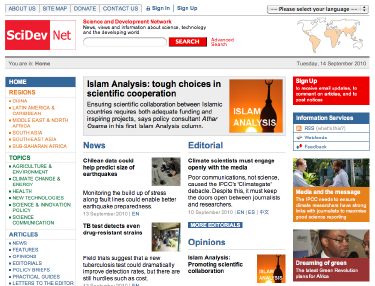Pardee Center Visiting Fellow Writes on Promoting Scientific Collaboration in the Muslim World

Dr. Athar Osama, a Visiting Fellow at the Frederick S. Pardee Center for the Study of the Longer-Range Future, has just launched a new column on SciDev.Net, the Science and Development Network, called “Islam Analysis.” His first column in the new series is titled “Promoting Scientific Collaboration,” and reviews the state of scientific cooperation in the Islamic world and argues that, “Scientific cooperation between Islamic countries has a lacklustre record, marked by a shortage of resources and a lack of political will for investment. The few countries that have invested heavily in recent years — including Iran, Pakistan, Qatar and Saudi Arabia — have chosen to work instead with scientifically advanced countries in North–South collaborations that offer more obvious benefits than partnerships among themselves.”
Dr. Osama’s new column builds in part on the arguments he had first advanced in a Pardee Center Issues in Brief on “Fostering South-South Research Collaborations“ (Issues in Brief No. 2, September 2008). For example, the column in SciDev.Net maintains that “the need for South–South cooperation is becoming increasingly clear, particularly on shared problems, such as tropical diseases, agriculture or threats from climate change, that are unique to the developing world or have low priority in the North.”
SciDev.Net is designed to “give policymakers, researchers, the media and civil society information and a platform to explore how science and technology can reduce poverty, improve health and raise standards of living around the world.”
Read full column Islam here.